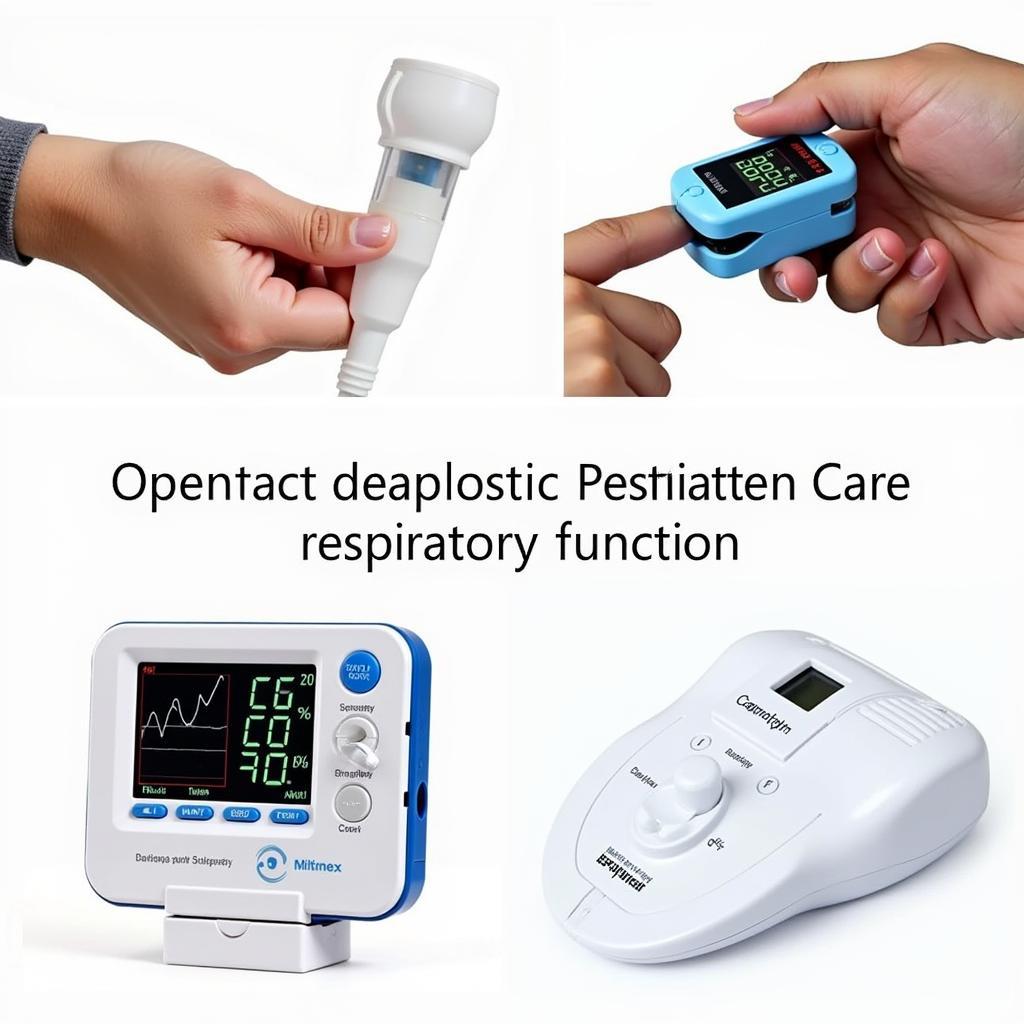Respiratory Care Tools play a vital role in diagnosing, treating, and managing a range of respiratory conditions. From simple oxygen masks to sophisticated ventilators, these tools are essential for maintaining and improving respiratory health in patients of all ages. This guide delves into the various types of respiratory care tools, their applications, and the advancements driving the field forward.
Understanding Different Types of Respiratory Care Tools
Respiratory care tools encompass a broad spectrum of devices, each designed for specific purposes. These tools can be categorized based on their function, complexity, and the setting in which they are used. Let’s explore some of the key categories:
Oxygen Therapy Equipment
Oxygen therapy is a cornerstone of respiratory care, and a variety of tools are used to deliver supplemental oxygen. These include:
- Nasal Cannulas: These lightweight tubes deliver oxygen through the nostrils, offering convenience and patient comfort.
- Oxygen Masks: Various masks, such as simple face masks, Venturi masks, and non-rebreather masks, provide different oxygen concentrations depending on the patient’s needs.
- Oxygen Concentrators: These devices extract oxygen from the surrounding air, providing a continuous supply of oxygen without the need for bulky oxygen tanks.
Airway Management Tools
Maintaining a clear airway is crucial for effective respiration. Several tools assist in managing the airway, including:
- Endotracheal Tubes: These tubes are inserted into the trachea to secure the airway and facilitate mechanical ventilation.
- Suction Catheters: These are used to remove secretions and maintain airway patency.
- Laryngoscopes: These instruments allow visualization of the larynx for intubation.
bedside guide for neonatal care: learning tools to support practice
Mechanical Ventilation Devices
For patients who cannot breathe adequately on their own, mechanical ventilation provides respiratory support. Ventilators come in various types, including:
- Invasive Ventilators: These require intubation and provide controlled breaths to the patient.
- Non-Invasive Ventilators: These deliver positive airway pressure through a mask, avoiding the need for intubation.
Diagnostic Respiratory Care Tools
Accurate diagnosis is essential for effective treatment. Diagnostic tools include:
- Pulse Oximeters: These devices measure blood oxygen saturation levels.
- Spirometers: These assess lung function by measuring the volume and flow of air during breathing.
- Capnographs: These monitor carbon dioxide levels in exhaled breath.
primary care asthma control screening tool
“Accurate diagnosis is the first step towards effective respiratory care,” says Dr. Amelia Reed, a leading pulmonologist at the Chicago Respiratory Institute. “Utilizing the right diagnostic tools can significantly impact patient outcomes.”
 Diagnostic Respiratory Care Tools: Pulse Oximeters, Spirometers, and Capnographs
Diagnostic Respiratory Care Tools: Pulse Oximeters, Spirometers, and Capnographs
Advancements in Respiratory Care Tools
The field of respiratory care is constantly evolving, with new technologies and innovations improving patient care. Recent advancements include:
- Portable Ventilators: These offer greater mobility for patients requiring respiratory support.
- Smart Inhalers: These devices track medication usage and provide feedback to patients and healthcare providers.
- Telehealth Applications: These allow remote monitoring of patients with respiratory conditions.
“The integration of technology into respiratory care is revolutionizing the way we manage respiratory conditions,” states Dr. David Chen, a biomedical engineer specializing in respiratory devices. “These advancements empower patients and enhance the effectiveness of treatment.”
basic knowledge assessment tool for critical care nursing
Conclusion
Respiratory care tools are indispensable for managing various respiratory conditions, enabling healthcare professionals to diagnose, treat, and monitor patients effectively. From basic oxygen delivery systems to advanced ventilators, these tools play a crucial role in maintaining and improving respiratory health. Continued advancements in technology promise even more sophisticated and patient-centered respiratory care in the future. Understanding these tools and their applications is crucial for anyone involved in respiratory care.
critical care physical assessment tool
Need assistance with car diagnostics? Contact us via WhatsApp: +1(641)206-8880, Email: [email protected], or visit our office at 910 Cedar Lane, Chicago, IL 60605, USA. We offer 24/7 customer support.

Leave a Reply